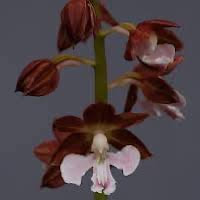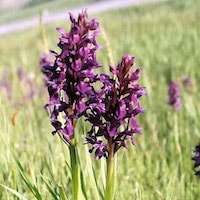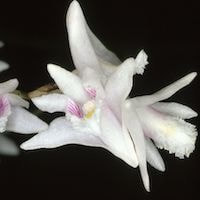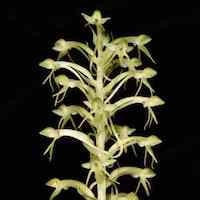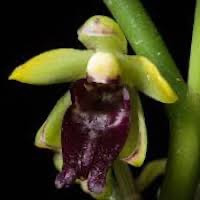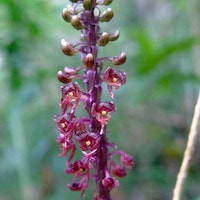Enriching Scent Notes in 'Contains Scented Notes' Perfume
The fragrance composition "Contains Scented Notes" is a captivating blend of various orchids and aromatic elements. Among the native Singaporean orchids, Sophrolaeliocattleya Dream Walk stands out as a compact Cattleya hybrid with large, lavender-colored flowers emitting a highly fragrant scent. It has been carefully selected as a key ingredient for the Woody 12 perfume, specially designed for a women's team-building perfume workshop.
Within the therapeutic orchid notes, Calanthe Brown captures attention as a genus comprising around 220 species, commonly known as Christmas orchids. These terrestrial plants boast thick roots, small oval pseudobulbs, and large corrugated leaves. The narrow sepals and petals, along with a distinctive labellum, add to their unique appearance. Calanthe was the first orchid species to be artificially hybridized by humans, and its name beautifully translates to "beautiful flower."
Dactyloriza umbrosa, also referred to as Dark Dactylorhiza, thrives in temperate and sub-arctic regions of Asia, including Pakistan, Afghanistan, and northern Iran. In Iran, it serves a practical purpose as it is used to prepare salep. Extracts from its pseudobulbs have shown antimicrobial and antifungal properties, while its matured fruits are valued for their aphrodisiac qualities.
Dendrobium nodosum Dalzell. syn. Flickingeria nodosa (Dalzell) Seidenf. is an intriguing epiphyte with creeping rhizome stems and slender, erect or pendulous, branching pseudobulbs. In Uttara Kanada, Karnataka Province, it is used to create a sweet-tasting "halva" with expectorant properties, aiding in the treatment of respiratory ailments, throat infections, and biliousness. Additionally, it exhibits antimicrobial and antifungal effects.
Habenaria furcifera Lindl. Syn. Habenaria ovalifolia, a terrestrial herb, can be found in deciduous forests along moist slopes near streams across various Asian countries. Blooming from August to September in India, its tubers are employed in Ayurvedic medicine to address wasting diseases, fever, blood disorders, hemorrhages, and snakebites.
Luisia teres (Thunb.) Blume, an epiphyte with long, thin stems, presents numerous leaves and blossoms during March to May. This orchid is often found on tree trunks in exposed locations and has herbal uses for reducing swelling, treating tumors, acting as a counter-poison, and aiding in fracture healing as per Taiwanese herbalists.
Malaxis versicolor (Lindl.) Abeyw. Syn. Microstylis vesicolor Lindl., Seidenfia versicolor Marg. and Szlach. showcases varying colors dependent on light intensity, spanning from pure green in bright light to deep purple in the shade and yellowish in-between. In the western part of the Indian peninsula, it is used to create a potion to treat fever, biliousness, and infantile epilepsy. It also plays a significant role in the Indian "rejuvenating" tonic Astavarga, renowned for its tonic, aphrodisiac, and fertility-boosting properties.
The fragrance "Contains Scented Notes" is further enriched with other alluring scent notes, including Sweet Indian Sandalwood, balsamic, wood mix, Belambra tree, Larch, Neem, and Muhuhu, contributing to the perfume's complexity and depth.
Overall, "Contains Scented Notes" presents a diverse array of fragrances, highlighting the captivating beauty and therapeutic potential of orchids alongside complementary aromatic elements, creating an enchanting and multifaceted perfume blend.
Within the therapeutic orchid notes, Calanthe Brown captures attention as a genus comprising around 220 species, commonly known as Christmas orchids. These terrestrial plants boast thick roots, small oval pseudobulbs, and large corrugated leaves. The narrow sepals and petals, along with a distinctive labellum, add to their unique appearance. Calanthe was the first orchid species to be artificially hybridized by humans, and its name beautifully translates to "beautiful flower."
Dactyloriza umbrosa, also referred to as Dark Dactylorhiza, thrives in temperate and sub-arctic regions of Asia, including Pakistan, Afghanistan, and northern Iran. In Iran, it serves a practical purpose as it is used to prepare salep. Extracts from its pseudobulbs have shown antimicrobial and antifungal properties, while its matured fruits are valued for their aphrodisiac qualities.
Dendrobium nodosum Dalzell. syn. Flickingeria nodosa (Dalzell) Seidenf. is an intriguing epiphyte with creeping rhizome stems and slender, erect or pendulous, branching pseudobulbs. In Uttara Kanada, Karnataka Province, it is used to create a sweet-tasting "halva" with expectorant properties, aiding in the treatment of respiratory ailments, throat infections, and biliousness. Additionally, it exhibits antimicrobial and antifungal effects.
Habenaria furcifera Lindl. Syn. Habenaria ovalifolia, a terrestrial herb, can be found in deciduous forests along moist slopes near streams across various Asian countries. Blooming from August to September in India, its tubers are employed in Ayurvedic medicine to address wasting diseases, fever, blood disorders, hemorrhages, and snakebites.
Luisia teres (Thunb.) Blume, an epiphyte with long, thin stems, presents numerous leaves and blossoms during March to May. This orchid is often found on tree trunks in exposed locations and has herbal uses for reducing swelling, treating tumors, acting as a counter-poison, and aiding in fracture healing as per Taiwanese herbalists.
Malaxis versicolor (Lindl.) Abeyw. Syn. Microstylis vesicolor Lindl., Seidenfia versicolor Marg. and Szlach. showcases varying colors dependent on light intensity, spanning from pure green in bright light to deep purple in the shade and yellowish in-between. In the western part of the Indian peninsula, it is used to create a potion to treat fever, biliousness, and infantile epilepsy. It also plays a significant role in the Indian "rejuvenating" tonic Astavarga, renowned for its tonic, aphrodisiac, and fertility-boosting properties.
The fragrance "Contains Scented Notes" is further enriched with other alluring scent notes, including Sweet Indian Sandalwood, balsamic, wood mix, Belambra tree, Larch, Neem, and Muhuhu, contributing to the perfume's complexity and depth.
Overall, "Contains Scented Notes" presents a diverse array of fragrances, highlighting the captivating beauty and therapeutic potential of orchids alongside complementary aromatic elements, creating an enchanting and multifaceted perfume blend.
Download the guided mediation that works best with this Orchid fragrance oil
| women_woody_essential_oil_orchi_00012.mp3 | |
| File Size: | 90354 kb |
| File Type: | mp3 |
Diverse Fragrances: Orchids and Aromatic Elements
Contains Scented Notes of following in various proportions:
Native Singaporean Orchid notes: Sophrolaeliocattleya Dream Walk
|
Sophrolaeliocattleya Dream Walk - Used in Woody 12 (Women) for Team building Perfume workshop
Sophrolaeliocattleya Dream Walk is a captivating orchid hybrid known for its delightful fragrance. This hybrid is the result of crossing two orchid species, with the walkeriana parent contributing to its unique characteristics. The name "Sophrolaeliocattleya" is a combination of the genera Sophronitis, Laelia, and Cattleya, which are well-known and popular orchid genera. This hybrid is also commonly referred to as "Dream Walk." One of the key features of Sophrolaeliocattleya Dream Walk is its compact size, making it a manageable and visually appealing orchid. The inflorescences produce relatively large, elegant flowers with a striking lavender hue. These flowers are not only visually alluring but also emit a highly fragrant scent, making them a sought-after choice for perfumery and aromatic creations. The fragrance of Sophrolaeliocattleya Dream Walk is described as being very fragrant, which suggests that its scent is potent and pleasant. The specific fragrance notes are not provided in the available information, but it is common for orchids to emit a variety of scents, ranging from sweet and floral to spicy and citrusy, with some orchids even releasing subtle vanilla or chocolate-like aromas. Due to its exquisite fragrance and visual appeal, Sophrolaeliocattleya Dream Walk has been carefully selected as a significant ingredient in the perfume Woody 12. This particular perfume has been designed specifically for women participating in team-building perfume workshops, making it a unique and personalized scent that can create a sense of unity and collaboration among the participants. Overall, Sophrolaeliocattleya Dream Walk is a remarkable orchid hybrid with its compact size, large and fragrant lavender flowers, and captivating scent. Its inclusion in the Woody 12 perfume further enhances its allure and highlights its potential as a key aromatic element in perfumery. |
Therapeutic Orchid notes:
|
Genus: Calanthe Brown
Calanthe, commonly called Christmas orchids, is a genus of about 220 species. Chinese name: Xiaji Lan (prawn spine orchid) Japanese name: Ebine The genus Calanthe, commonly known as Christmas orchids, comprises approximately 220 species. These orchids are revered for their captivating scent and are known by various names in different regions, such as "Xiaji Lan" (prawn spine orchid) in Chinese and "Ebine" in Japanese. Calanthe orchids are terrestrial plants characterized by their thick roots, small oval pseudobulbs, and large corrugated leaves. The sepals and petals of their flowers are narrow and similar in size to each other, while the labellum typically has spreading lobes, adding to their elegant appearance. One of the distinguishing features of Calanthe orchids is their sympodial growth pattern, where they possess short stems and several plicate, elliptical leaves that are arranged in a spiral or two rows, tightly ensheathing the stem. The inflorescences, which emerge from the side or base of the plant, bear many striking and showy flowers in a short raceme, enhancing the visual appeal of these orchids. Notably, Calanthe holds the distinction of being the first orchid species to be artificially hybridized by humans. The name "Calanthe" itself is derived from two Greek words, "kalos" (beautiful) and "anthe" (bloom), which aptly translates to "beautiful flower." This nomenclature highlights the exceptional beauty of Calanthe orchids, which has captivated orchid enthusiasts and botanists alike. The fragrance of Calanthe orchids varies among species, with some emitting sweet and floral scents, while others may have spicy or citrusy undertones. The scent of Christmas orchids adds to their allure and contributes to their popularity in the world of perfumery and aromatic creations. Overall, Calanthe orchids, with their diverse species and captivating scents, remain a cherished group of orchids in the botanical world. Their beauty, fragrance, and historical significance as the first artificially hybridized orchid species make them a fascinating subject of study and appreciation among orchid enthusiasts and horticulturists. |
|
Dactyloriza umbrosa (Kar and Kir.) Nevski
Common name: Dark Dactylorhiza Chinese name: Yin Sheng Zhang Lie Lan Dactylorhiza umbrosa, commonly known as Dark Dactylorhiza, is a robust and hardy species of orchid that flourishes in temperate and sub-arctic regions of Asia. It can be found in various countries, including Pakistan, Afghanistan, and northern Iran. In China, it is known as "Yin Sheng Zhang Lie Lan." One of the notable uses of Dactylorhiza umbrosa is for the preparation of salep. Salep is a traditional beverage made from the dried and ground tubers of certain orchid species, including Dactylorhiza umbrosa. In Iran, the tubers of this orchid are harvested for this purpose. Salep has a long history of culinary and medicinal uses in various cultures. The drink is known for its rich and creamy texture, with a flavor reminiscent of vanilla. It is often consumed as a hot beverage, especially during the winter months. In addition to its culinary applications, salep has been used in traditional medicine for various purposes. It's important to note that the harvesting of orchid tubers for salep has raised concerns about sustainability and conservation. Overharvesting of wild orchids for salep and other uses has led to the decline of some orchid populations in their natural habitats. As a result, measures have been taken to regulate the harvesting and trade of orchid tubers to ensure their preservation in the wild. While Dactylorhiza umbrosa has culinary and medicinal significance, it is also valued for its ecological role in the regions it inhabits. Orchids play essential roles in their ecosystems, supporting pollinators and contributing to biodiversity. In conclusion, Dactylorhiza umbrosa, also known as Dark Dactylorhiza, is a robust orchid species with a significant cultural and ecological importance. Its tubers are used for the preparation of salep, a traditional beverage with culinary and medicinal applications. However, it is crucial to manage the harvesting of these orchids to ensure their conservation and preservation in their natural habitats. |
|
Dendrobium nodosum Dalzell. syn. Flickingeria nodosa (Dalzell) Seidenf.
Indian names: Purushratna (Kannada) Jiwanti (Ayurveda) This epiphyte has a creeping rhizome stems with well-spaced, slender, erect or pendulous, branching pseudobulbs. Dendrobium nodosum, also known as Flickingeria nodosa, is an epiphytic orchid species with creeping rhizome stems and well-spaced, slender, erect, or pendulous, branching pseudobulbs. It is native to various regions, including India, where it is known by several names, such as "Purushratna" in Kannada and "Jiwanti" in Ayurveda. One of the notable traditional uses of Dendrobium nodosum in Uttara Kanada, Karnataka Province, is for preparing a sweet-tasting "halva." This halva is used as an expectorant in Ayurvedic medicine and is employed to treat respiratory conditions such as asthma, bronchitis, and "tridosha" imbalances. Additionally, it is utilized as a remedy for throat infections and is considered an astringent for biliousness and blood purification. Beyond its culinary applications, Dendrobium nodosum has exhibited significant medicinal properties in scientific studies. Cold extracts derived from the pseudobulbs of Flickingeria nodosa (equivalent to ¼ Dendrobium nodosum) demonstrated antimicrobial activity against Staphylococcus aureus, a common cause of superficial infections, and Staphylococcus citreus, which is also responsible for skin infections. Moreover, warm extracts from the pseudobulbs have shown antifungal activity against Trichophyton mentagrophytes, a fungus that causes skin inflammation and infections, including athlete's foot. These findings highlight the potential therapeutic applications of the orchid in treating microbial and fungal infections. In addition to its medicinal uses, matured fruits of Dendrobium nodosum are regarded as an aphrodisiac in traditional practices. It is believed to possess properties that enhance sexual vitality and desire. In conclusion, Dendrobium nodosum is a versatile orchid species with culinary and medicinal significance. In Ayurvedic medicine, its sweet-tasting "halva" is utilized as an expectorant and for treating respiratory and throat conditions. Additionally, scientific studies have shown its antimicrobial and antifungal properties, making it potentially valuable in combatting certain infections. The orchid's matured fruits are also associated with aphrodisiac effects. Nevertheless, further research is required to fully understand and harness the therapeutic potential of this intriguing orchid species. |
|
Habenaria furcifera Lindl. Syn. Habenaria ovalifolia
Chinese name: Mihuayufeng Hua Habenaria furcifera, also known as Habenaria ovalifolia, is a terrestrial orchid with significant medicinal importance, especially in Ayurveda. Commonly referred to as "Mihuayufeng Hua" in Chinese, this orchid species can be found thriving in deciduous forests along moist slopes near streams in various regions, including western Peninsular India, Pakistan, Nepal, Bhutan, Sikkim, Myanmar, China, Thailand, and Laos. The flowering period of Habenaria furcifera occurs primarily in August and September in India, with variations that extend to other parts of its range. During this time, the orchid showcases its remarkable beauty through its delicate and captivating blooms. In traditional herbal practices, the tubers of Habenaria furcifera are highly valued for their therapeutic properties. In Ayurveda, a traditional system of medicine in India, these tubers are utilized in the treatment of various health conditions. One of the notable applications of the orchid's tubers in Ayurvedic medicine is to address wasting diseases, which are characterized by the progressive loss of body mass and strength. Additionally, the tubers are used to manage fevers and blood disorders, making them a valuable resource in treating illnesses that affect the circulatory system. Moreover, Habenaria furcifera's tubers are employed as an intervention for hemorrhages, helping to control and reduce excessive bleeding. In cases of fainting or loss of consciousness, the orchid's tubers are utilized to aid in recovery. Apart from their internal applications, the orchid's tubers are also used externally. A paste made from the tubers is applied to cuts and wounds to promote healing and support the body's natural repair processes. Additionally, the paste is employed to treat snake bites, possibly owing to the orchid's purported medicinal properties that can counteract the effects of venom. As with all herbal remedies, it is essential to approach the use of Habenaria furcifera with caution and under the guidance of qualified practitioners. While traditional practices have valued this orchid for its therapeutic benefits, further scientific research is necessary to validate and fully understand the efficacy and safety of its applications. In summary, Habenaria furcifera is a terrestrial orchid species with a notable presence in traditional herbal medicine. Its tubers hold significant medicinal value and are used in Ayurveda to address wasting diseases, fevers, blood disorders, hemorrhages, and fainting. Additionally, the tubers are employed externally for wound healing and snake bite treatment. While these traditional uses are deeply rooted in cultural practices, further scientific exploration is required to confirm the effectiveness and safety of these applications. |
|
Luisia teres (Thunb.) Blume
Chinese names: Jinchajiao (gold hairpin), Chaizigu (bunched hairpins), Yuanzhuchaizigu (round pillar hairpin), Yanggunzi (goat stick), Yangangdou (stony long bean), Xiaohuangcao (small yellow grass), Chachunchaizigu Luisia teres, also known as Thunberg's Luisia, is an epiphytic orchid species with various Chinese names, including Jinchajiao (gold hairpin), Chaizigu (bunched hairpins), Yuanzhuchaizigu (round pillar hairpin), Yanggunzi (goat stick), Yangangdou (stony long bean), Xiaohuangcao (small yellow grass), and Chachunchaizigu. This orchid is renowned for its unique and captivating scent, making it a valuable addition to various traditional practices. The plant's appearance includes long, thin, and terete stems that can reach up to 55 centimeters in length, carrying numerous leaves. Some varieties, particularly the Japanese type, display a solid maroon lip, enhancing the beauty of its inflorescence. The flowering season of Luisia teres typically occurs between March and May, adding splendor to its natural habitat, where it can be found growing on tree trunks in exposed locations. In traditional herbal usage, Luisia teres holds medicinal significance and is utilized for various health conditions, particularly those related to swelling and edema. The entire plant is employed to address edema caused by fractures, acting as a potent anti-inflammatory agent to reduce swelling and promote the body's healing processes. Furthermore, this orchid has been utilized in the treatment of tumors and as a counter-poison. The medicinal properties of Luisia teres are believed to be beneficial in addressing carcinoma and malaria, suggesting its potential in managing severe illnesses. In Taiwan, herbalists have embraced Luisia teres for its ability to reduce swelling and facilitate the healing of fractures. The orchid's anti-inflammatory properties are considered valuable in promoting recovery and alleviating discomfort associated with fractures. While Luisia teres has a rich history of traditional usage, it is crucial to approach its medicinal applications with care and under the guidance of qualified practitioners. As with all herbal remedies, the safety and effectiveness of its usage require further scientific research and validation. In conclusion, Luisia teres is an epiphytic orchid species appreciated for its distinctive and alluring scent. It boasts several Chinese names, highlighting its cultural significance. In traditional herbal practices, the entire plant is utilized to address swelling, fractures, tumors, and certain illnesses. However, further scientific exploration is essential to fully comprehend and confirm its therapeutic properties and ensure safe and responsible usage. |
|
Malaxis versicolor (Lindl.) Abeyw. Syn. Microstylis vesicolor Lindl., Seidenfia versicolor Marg. and Szlach.
Malaxis versicolor, also known as Jeevak, is an orchid species celebrated for its unique and fascinating scent. The appearance of this orchid is equally intriguing, as the color of both the plant and its flowers is influenced by the intensity of light it receives. Under bright light, the plant exhibits a pure green hue, while in shaded conditions, it transforms into a deep purple shade. In intermediate light conditions, the color appears yellowish, adding to its captivating allure. Beyond its aesthetic appeal, Malaxis versicolor holds significant medicinal value in traditional practices, particularly in the western part of the Indian peninsula. A potion made from the plant is employed to address various health conditions, including fever, biliousness, and infantile epilepsy. The use of this potion illustrates the orchid's versatility in traditional medicine and its ability to tackle a range of health concerns. Moreover, Jeevak has gained popularity as a well-regarded medicinal herb in India, earning its reputation as a potent tonic and aphrodisiac. Its applications extend to diverse medical conditions such as fever, dysentery, and rheumatism, as well as minor complaints like insect bites. Additionally, Jeevak is believed to have fertility-boosting properties, making it a sought-after remedy in matters related to reproductive health. In the realm of traditional medicine, Malaxis versicolor plays a pivotal role in an Indian "rejuvenating" tonic known as Astavarga. This tonic acts as both an aphrodisiac and a semen booster, highlighting the significant impact of Jeevak and its counterpart Crepidium acuminatum (Rishbaka) on overall well-being and vitality. While Jeevak holds a revered status in traditional medicine, it is essential to recognize that further scientific research is crucial to substantiate its medicinal claims fully. The safety, efficacy, and dosage recommendations for its usage require careful investigation and validation. In conclusion, Malaxis versicolor, also known as Jeevak, is an orchid species celebrated for its intriguing scent and color-changing characteristics influenced by light intensity. With a rich history in traditional medicine, this orchid holds promise in addressing various health conditions and serving as a tonic and aphrodisiac. However, thorough scientific research is essential to validate and understand its medicinal properties fully. As with all herbal remedies, it is crucial to approach its usage under the guidance of qualified healthcare practitioners to ensure safe and responsible practices. |
Other scent note
Sweet Indian Sandalwood, balsamic, wood mix, Belambra tree, Larch, Neem, Muhuhu
Scentopia Library Reference ingredient
Amber - Check details at Scentopia's scent library
Join Scentopia's wonderful orchid scent crafting, fragrance tour, bridal shower or corporate team building which includes perfume making onsite and offsite, beach activities and more. We also serve primary school learning journey, secondary students and pupil on industrial excursions. Know more about our orchids perfume bar or therapeutic orchid scents and other wellness aromas. Conatct Perfume workshop or book a scent crafting session here.

